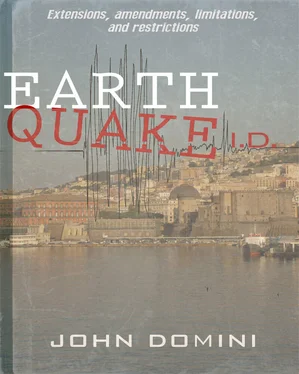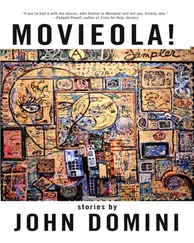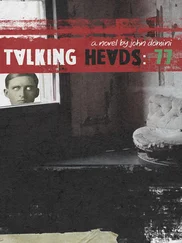The old medico wouldn’t ask any difficult questions, either. With a scrubbed hand DiPio waved Paul into the hidden room. The boy at least had a moment for his mother, her mouth still ajar and her heat still visible. But Papa sat closer to the door, and he and Paul sank into a wordless hug.
The doctor went for the clutter around his neck. “Your husband, your son,” he gushed at Barbara, “they have done something wonderful.”
The Jaybird lifted his head. “You ask me,” he said, “my whole family is wonderful.”
The mother reminded herself that, to her and Jay, the tears of their eleven-year-old were in no way supernatural. She and Jay knew what they’d put Mr. Paul through, lately; this wasn’t the first time he’d seen his parents upset. Besides, once Barbara and the others shuffled back out into the clinic corridor, it turned out she’d been right to speak up when she did. Her harsh words clanged around her head like a mugger’s iron — but she’d been right to seize the moment. Out in the hallway she had to deal with NATO and the UN.
Both had sent a man, and each man wore a jacket and tie, severe for this weather. Talk about the opposite of an Italian romance.
Of course Barbara had seen the paperwork for Jay’s appointment. The family could never have made this move without the presence of the Sixth Fleet and a half-dozen relief agencies headquartered at East Forty-forth and FDR Drive. Nonetheless, for most of her life NATO and the UN had existed only as acronyms stretching across a map, newsprint black on newsprint gray. She would never have imagined that they could appear as full-color guys in uncomfortable clothes, down at the same level as stackable plastic chairs. The UN representative at least looked something like what you would expect, unsmiling and some degree of Arabian, in banker’s clothing. But the one who said he worked with NATO, he was an eyeful. This man had allowed himself a canary-colored jacket, Palm Beach, and he wore his blonde hair Botticelli-long. He wore it in an exaggerated flip, swept back from a fraying hairline that put him on the far side of thirty-five. Also this officer did most of the talking, if you could call it talking.
It’s the understanding of our organizations that these American citizen volunteers have no compelling medical reason for staying on in this establishment…it’s our belief that on their way home they could use a protected ride…it’s our understanding that these citizen volunteers also have need of certain documents in our possession…
Barb had the thought that she’d gone from a closet full of whacking truths to a public square full of pillow-soft lies. Yet she couldn’t be angry with these newcomers either. Queer as the NATO man came across, with that line of talk, he and the other allowed Barbara and her family to escape. They were even spared the usual release forms. The Palm Beach Botticelli took care of those, explaining that he and the other official would make the trip to the family’s apartment with them, and along the way “address any pressing concerns.”
The “protected ride” waited out front. It took up the entire medieval via , a cop at either end waving away traffic: a Humvee transport big enough to scare away even the rankest amateur of a scippatoro . Plus inside sat a soldier in Treaty Organization blues. Nordic, young, muscled enough to stretch the sleeves of his uniform, the GI held a small machine gun.
The weapon smelled of oil and was shaped like an H. H, Barb thought, for What the Hell?
But the police had no objections. DiPio too went along with the NATO request, though his wrinkled features showed a certain distaste, button-mouthed. The doctor lingered with the family in the cramped space between his doorway and the vehicle’s, one last time touching a finger to Paul’s chest.
“To heal is always good,” he said. “One time, ten times, is always good.”
Ten times? What the hell?
The family had been set up in an apartment on one of the hills overlooking the Bayfront. Now as the van began its climb out of the old city Barbara tried to focus on the practical. Child care was the first concern, now as ever; she needed someone reliable in place before she headed back to New York to draw up the papers. But the seat facing her, next to the gun, had been taken by the flamboyant NATO man. Not only was he intent on making conversation, but he used an entirely different voice than he had back in the clinic.
“Mn, che casino.” A Southern tourist’s voice, Dixie Italian. “No rest for the wandering Ulysses.”
Was this public relations? Making nice for the injured homeboys?
“Ulysses,” NATO repeated. “Except in this case, he’s got the wife with him.”
Barb shook her head. She tried to recall whether, from this end of the Atlantic, the airlines needed fourteen or twenty-one day notice.
“Mn. Doubt y’all’ve even had time to get over the jet lag.”
Jay sighed stagily. “Murphy’s Law.”
NATO studied the husband as if waiting for more. Finally: “Tomorrow you’ve got to call the bank, one.”
“The bank. Hey.” Another extravagant exhale. “I don’t think their switchboard has a number for this.”
The official laughed again, thumb-stroking one bright lapel. But Jay never cracked a smile. Barb would’ve imagined that this kind of talk would feel familiar to him. The guy across the Humvee’s aisle was a kind of executive, an Organization man. He might wear a nightclub hairdo or slip in a bit of Homer, but that didn’t take the conversation out of shoptalk. Jay however wasn’t looking at their host. Barb’s husband kept his handsome head turned her way.
“No number for this,” he said.
Her interior blade started cutting in a fresh direction.
“Mn,” Dixie was saying. “Anyhow the worst is over, grazia a dio . And we’ve brought something that’s going to help.”
The UN rep nodded just visibly, adjusting the briefcase on his lap. The NATO man introduced himself. Kahlberg — Silky Kahlberg.
“Silky?” Barbara asked.
The Arab gave a snort. Kahlberg however kept smiling, his hand extended. His coloring was almost as Viking-pale as that of the soldier beside him, and the man’s grip suggested he’d spent some time with a gun in his hands himself. His sleek blonde mop (okay, silky) must’ve been one of the privileges of rank: Kahlberg announced that he was a major. “Actually a Lieutenant-Major. Though I doubt y’all know the difference.”
The man lost something off his smile. But he went on to declare, more or less cheerfully, that his job was “PR plain and simple. Public liaison, capisce? Events, communications, Jay here knows what I’m talking about.”
He did? Barbara’s Jaybird had worked in sales, not advertising. Kahlberg went on to explain that, since the quake, he’d also handled Public Affairs for the international relief efforts. “Working two jobs, see what I’m saying? The Organization and the UN, they’ve both got a piece of me.”
“And you’ve got a piece of both payrolls,” Jay said.
Kahlberg gave a shrug. “Jay, sounds to me like you don’t understand. You don’t know what we’re up to, here. In Naples, anymore, it’s not about worlds to conquer.”
“I don’t want worlds to conquer. All I want’s right here in this van. My family.”
“Touché, big shooter. Touché, but Jay — anymore, that’s all we want too. The Organization and the UN, these days we’re all about happy families, families like yours. That’s quality of life, democracy on the march. That’s the Pax Americana.”
“Wait a second.” This was Chris, who liked history. “Pax…?”
“Mn.” The liaison officer tucked his hair behind one ear. “Got a bright kid here, Jay. Bright kid, he’s thinking the Roman thing, Pax Romana . He’s thinking, ‘strength and honor.’” The man was good at Gladiator , too.
Читать дальше












